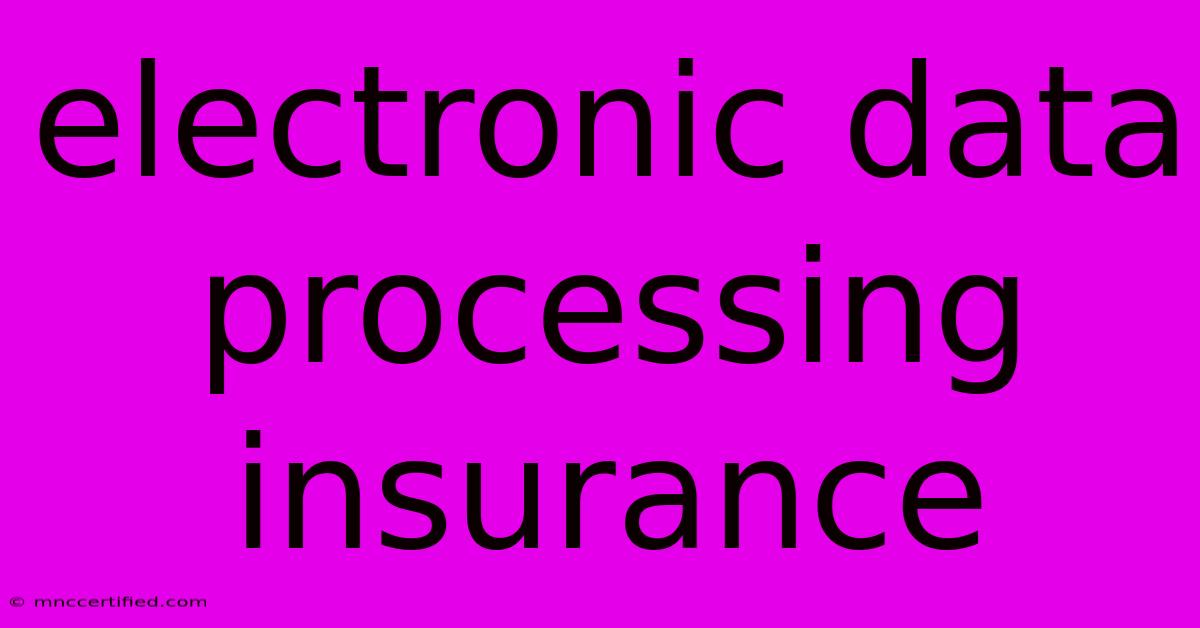Electronic Data Processing Insurance

Table of Contents
Protecting Your Digital Assets: A Comprehensive Guide to Electronic Data Processing Insurance
In today's digital age, data is king. From customer information to financial records, businesses rely heavily on electronic data processing to function. But what happens when this data is compromised? A cyberattack, hardware failure, or even a simple human error can cause significant damage, leading to financial losses, reputational harm, and even legal repercussions. This is where electronic data processing (EDP) insurance comes in.
What is Electronic Data Processing (EDP) Insurance?
EDP insurance, also known as cybersecurity insurance, is a specialized type of coverage designed to protect businesses against financial losses arising from data breaches, system failures, and other digital incidents. It provides financial protection for a range of risks, including:
- Data breaches: Loss of confidential data, customer information, or proprietary business secrets due to hacking, malware, or employee negligence.
- System failures: Hardware or software malfunctions that disrupt business operations and lead to data loss.
- Business interruption: Lost revenue and profits due to downtime caused by a data breach or system failure.
- Cyber extortion: Financial losses from ransomware attacks where attackers demand payment to restore access to data.
- Legal expenses: Costs associated with defending lawsuits or regulatory investigations arising from data breaches.
Why is EDP Insurance Essential for Your Business?
The digital landscape is constantly evolving, with new threats emerging daily. Ignoring the need for EDP insurance leaves your business vulnerable to a range of risks, including:
- Financial Ruin: Data breaches and system failures can lead to substantial financial losses from lost data, legal expenses, and regulatory fines.
- Reputation Damage: A data breach can severely damage your brand reputation, erode customer trust, and lead to a loss of business.
- Competitive Disadvantage: Downtime caused by data breaches can disrupt business operations, put you behind competitors, and lose you valuable market share.
- Legal Liabilities: You may face lawsuits from customers, employees, or regulatory bodies if your business fails to protect sensitive data.
Key Coverage Components of EDP Insurance
EDP insurance policies typically offer various coverage components tailored to your business needs. Some common coverage elements include:
- Data breach response: Expenses incurred to contain and mitigate the impact of a data breach, such as forensic investigations, notification costs, and credit monitoring services.
- Cyber extortion: Financial protection against ransom demands, including negotiation and payment costs.
- Business interruption: Compensation for lost revenue and profits during periods of downtime due to a data breach or system failure.
- Legal defense: Coverage for legal expenses associated with defending lawsuits or regulatory investigations arising from data breaches.
- Data restoration: Financial support for recovering lost data and restoring systems to operational status.
How to Choose the Right EDP Insurance Policy
Choosing the right EDP insurance policy requires careful consideration of your specific needs and vulnerabilities. Here are some factors to consider:
- Industry and business size: The level of risk and potential losses vary depending on your industry and the size of your business.
- Data sensitivity: The sensitivity and value of the data you handle will influence your insurance requirements.
- Existing security measures: Your existing cybersecurity measures and protocols will affect the level of coverage you need.
- Budget constraints: Consider the cost of different policies and the value of the protection offered.
- Policy exclusions: Review the policy carefully to understand any exclusions or limitations on coverage.
Implementing a Comprehensive Cybersecurity Strategy
EDP insurance is a crucial part of a comprehensive cybersecurity strategy, but it's not the only component. To protect your business effectively, you should also implement robust internal security measures, including:
- Strong passwords and access controls: Limit access to sensitive data and systems to authorized personnel.
- Regular security updates: Keep your software and hardware up-to-date to patch security vulnerabilities.
- Employee training: Educate employees on data security best practices and how to identify potential threats.
- Data backup and recovery: Regularly back up critical data and test your recovery procedures.
- Incident response plan: Develop a plan for responding to data breaches and other security incidents.
Conclusion
EDP insurance is no longer a luxury; it's a necessity for businesses operating in today's digital world. By protecting your data and mitigating potential losses, EDP insurance provides peace of mind and empowers you to focus on what matters most: growing your business.

Thank you for visiting our website wich cover about Electronic Data Processing Insurance. We hope the information provided has been useful to you. Feel free to contact us if you have any questions or need further assistance. See you next time and dont miss to bookmark.
Featured Posts
-
Live Stream Eagles Vs Cowboys Best Options
Nov 11, 2024
-
A1 Insurance In Columbus Mississippi
Nov 11, 2024
-
Chelsea 3 0 Liverpool Match Review And Analysis
Nov 11, 2024
-
Saleme Insurance Services Altoona Pa
Nov 11, 2024
-
Bills Vs Colts Watch Live Week 10 Time And Channel
Nov 11, 2024